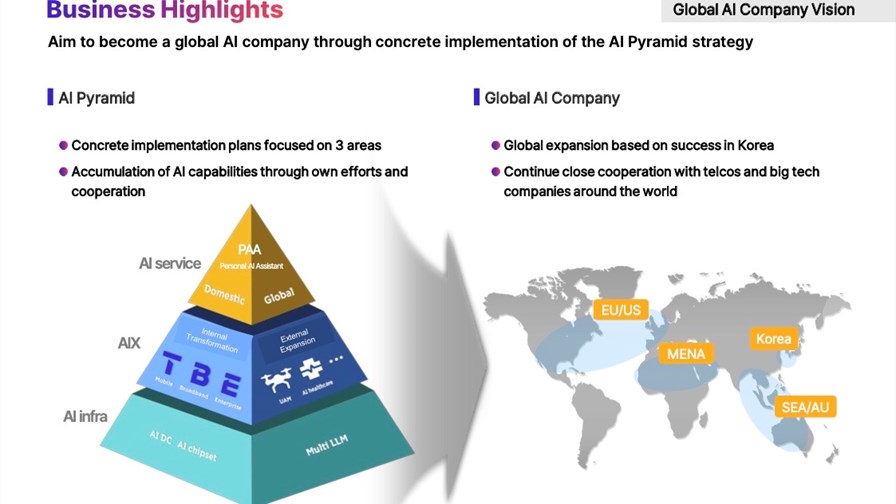
- SK Telecom is determined to play a dominant role in the AI era
- Its strategy to build its various operations around an AI focus appears to be working
- The telco reported revenue and profit gains in 2023
- In 2024, the South Korean operator is targeting sales growth across all of its AI-enabled business units
SK Telecom is reaping the rewards of its strategy to become a leading AI company, as each of its AI-focused divisions helped the South Korean network operator and digital service provider (DSP) to deliver revenue and operating profit gains in 2023.
SK Telecom (SKT) reported full year group revenues of 17.61tn Korean won (KRW), equivalent to some US$13.2bn, a year-on-year increase of 1.8%. Its operating profit rose more significantly – by 8.8% year on year to KRW 1.75tn ($1.3bn).
Those numbers were driven by “even growth” across all three of its key business areas – AI Infrastructure, AI Transformation (AIX) and AI Service – that together shape the AI Pyramid Strategy that was announced in September 2023 (see chart below).

Source: SK Telecom 2023 investor briefing presentation.
SKT is confident that its AI-driven units will achieve revenue growth on the back of the “strong AI infrastructure and technology capabilities it has built so far”. Its AI business is expected to rapidly expand sales this year to meet “steep growth in market demand”, especially through the delivery of AI-powered datacentre services, enterprise services, semiconductor products, and the further development of AI applications. One such offering is the A. (pronounced A dot) virtual personal assistant, which it has been developing for several years now and which is gaining traction with end users: In the final quarter of 2023, A. achieved a staggering 300% growth in cumulative subscribers since its beta service launch in May 2022 (though actual user numbers were not shared).
The operator also expects to achieve “tangible results” in 2024 from its initiative to build telco-specific large language models (LLMs) through in-house development and cooperation with global tech companies and regional telco leaders, especially via the Global Telco AI Alliance that SKT helped to set up last year. Some of its partners in this effort include German telco giant Deutsche Telekom and generative AI (GenAI) platform developer Anthropic: SKT aims to monetise its LLM offerings as part of its global expansion plans.
And what about other parts of SKT’s empire? The influential South Korean operator has been one of the most bullish metaverse service developers in the world and has gained a lot of traction domestically and through international partnerships for its in-house developed platform ifland over the past couple of years. But SKT’s financial report shows that user engagement with ifland in South Korea may already be in decline. Having peaked at 4.2 million in mid-2023, the number of ifland monthly active users (MAUs) fell to 3.6 million during the final quarter of 2023.
Its 5G subscriber base, though, continues to grow and ended 2023 at 15.7 million, up 17% from the 13.4 million 5G subscribers it boasted at the end of 2022.
The company also reported more than 30% year-on-year growth in both datacentre and cloud revenues, to 202bn KRW ($152m) and 146bn KRW ($110m) respectively in 2023.
Another notable takeaway from SKT’s results shows that the telco invested less in its networks last year than the year before, in line with efforts by many other global operators looking to tighten their purse strings, with its capital expenditure (capex) down 9.6% to 2.74tn KRW ($2.05bn).
- Yanitsa Boyadzhieva, Deputy Editor, TelecomTV
Email Newsletters
Sign up to receive TelecomTV's top news and videos, plus exclusive subscriber-only content direct to your inbox.




